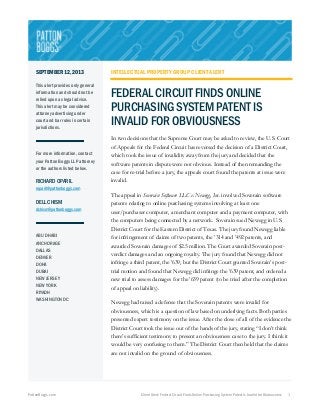
Federal Circuit Finds Online Purchasing System Patent is Invalid for Obviousness
- 1. SEPTEMBER 12, 2013 This alert provides only general information and should not be relied upon as legal advice. This alert may be considered attorney advertising under court and bar rules in certain jurisdictions. For more information, contact your Patton Boggs LLP attorney or the authors listed below. RICHARD OPARIL roparil@pattonboggs.com DELL CHISM dchism@pattonboggs.com ABU DHABI ANCHORAGE DALLAS DENVER DOHA DUBAI NEW JERSEY NEW YORK RIYADH WASHINGTON DC PattonBoggs.com Client Alert: Federal Circuit Finds Online Purchasing System Patent is Invalid for Obviousness 1 INTELLECTUAL PROPERTY GROUP CLIENT ALERT FEDERAL CIRCUIT FINDS ONLINE PURCHASING SYSTEM PATENT IS INVALID FOR OBVIOUSNESS In two decisions that the Supreme Court may be asked to review, the U.S. Court of Appeals for the Federal Circuit has reversed the decision of a District Court, which took the issue of invalidity away from the jury and decided that the software patents in dispute were not obvious. Instead of then remanding the case for re-trial before a jury, the appeals court found the patents at issue were invalid. The appeal in Soverain Software LLC v. Newegg, Inc. involved Soverain software patents relating to online purchasing systems involving at least one user/purchaser computer, a merchant computer and a payment computer, with the computers being connected by a network. Soverain sued Newegg in U.S. District Court for the Eastern District of Texas. The jury found Newegg liable for infringement of claims of two patents, the ’314 and ’492 patents, and awarded Soverain damages of $2.5 million. The Court awarded Soverain post- verdict damages and an ongoing royalty. The jury found that Newegg did not infringe a third patent, the ’639, but the District Court granted Soverain’s post- trial motion and found that Newegg did infringe the ’639 patent, and ordered a new trial to assess damages for the ’639 patent (to be tried after the completion of appeal on liability). Newegg had raised a defense that the Soverain patents were invalid for obviousness, which is a question of law based on underlying facts. Both parties presented expert testimony on the issue. After the close of all of the evidence the District Court took the issue out of the hands of the jury, stating “I don’t think there’s sufficient testimony to present an obviousness case to the jury. I think it would be very confusing to them.” The District Court then held that the claims are not invalid on the ground of obviousness.
- 2. PattonBoggs.com Client Alert: Federal Circuit Finds Online Purchasing System Patent is Invalid for Obviousness 2 On appeal, Newegg argued, among other things, that Newegg was deprived of its right to a jury trial on the obviousness question, pointing to the extensive testimony on this issue at trial. In a January 22, 2013 decision, the Federal Circuit rejected the argument. It ruled that Federal Rule of Civil Procedure 50 allows the trial court to remove cases or issues from the jury’s consideration when the facts are sufficiently clear that the law requires a particular result. The Court wrote that although here both sides had presented witnesses and evidence on the question of obviousness, the District Court’s removal of the legal question from the jury did not violate the right to jury trial. The Federal Circuit went on to hold that the District Court erred in finding that Soverain’s patents were not invalid. Instead of remanding the case back to the trial court, the Court of Appeals itself considered the evidence related to obviousness and found the patents to be invalid. Soverain argued that the prior art was distinguishable or pre-Internet. Soverain also argued that the patents were not obviousness because they had commercial success evinced by industry recognition licensing. The Federal Circuit did not find these arguments persuasive. The District Court’s judgment was reversed as to validity and the infringement award vacated. Soverain filed a petition for rehearing to clarify the decision. On September 4, 2013, the panel clarified that its ruling of invalidity also applied to a dependent claim of one of the patents. Soverain also asked the entire Federal Circuit to rehear the decision on the ground that the panel engaged in improper fact-finding and that the obviousness issue should have been sent back to the District Court for trial. The Court denied the petition for rehearing en banc in a September 4, 2013 Order. The Soverain case is potentially significant because while determining whether a patent claim is obvious is a question of law based on underlying facts. The Federal Circuit’s opinions suggest that the appellate court can resolve the defense as a matter of law, even where there may be some facts in dispute. The January 22, 2013 opinion in in Soverain Software v. Newegg can be found here and the September 4 opinion can be found here.
